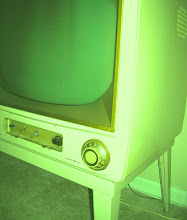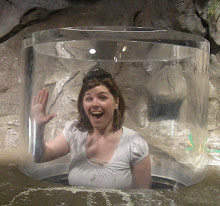
I hope you will forgive me for the bad pun that is the title, and if it hasn't made you roll your eyes too much, I hope you will continue reading. I do also realize the title is in reference to the David Bowie song not the red planet that is our neighbor in this universe, but not being one to pass up obvious puns, I just couldn't help myself.
What follows is a fairly lengthy post that covers generally the first two episodes of the U.S. Life on Mars. It isn't too spoilery, but if you don't want to know anything about the second episode please proceed with caution.
We are now two episodes into the new Life on Mars staring Jason O'Mara, Harvey Keitel, and Grethen Mol. Oh, and that Soprano's Guy. This has been the new show I have been most excited to watch, and in the interest of full disclosure this is partially because I loved the UK Life on Mars. And, despite my best efforts to NOT compare the two, I realize that was sort of impossible. (Just like if the UK decided to do a TV show called Lost about survivors of a plane crash, there is no way I couldn't compare it to you know, Lost). So, I decided to stop fighting this desire to not compare. Hopefully, I have at least compared on merit and not because it isn't the UK Life on Mars.
In answer to my title, yes I think there is Life on Mars. If you are not familiar with the story line the gist is that a modern-day New York City cop, Sam Tyler, is somehow transported back to the early 1970s after a car accident. The first episode was nearly a carbon copy of the original, but it was done well. The one part near the end, that was not a carbon copy is a very interesting change; I am withholding judgment on this change until later in the season to decide if this change is indicative of a larger one in the overall premise of the show. For now I will file it under the "Things that make you go hmmm" category, and I promise to revisit it at a later date.
Life on Mars is well shot, well-acted, and at least so far, well-written. I have not had any moments where I thought something happened too conveniently or was used as a plot device. In short, it as all seemed very organic. I liked it and I want to see more.
At the basic level this show is about relationships; the crime of the week is a way of examining the relationships Sam has with people both present and past (or present and future depending on how you want to look at it). The most interesting and important of these, in my opinion, is the one that develops between Sam and Gene Hunt, the Lieutenant in charge of the 125 Division. They are certainly a ying and a yang; Sam is meant to be more nuanced and a thinker, Gene is more simply brute force. That the technology (or lack thereof) of the 1970s dictates a different way of policing than it does in late 2000s has a lot to do with these basic differences. Sam and Gene are at first very antagonistic toward each other, but as shown in the second episode, are growing to respect each other. Gene's character is very revealing of Sam's inner-character in the UK edition, we'll see how it is in this one.
The other relationship I was most drawn to in the UK series is that of Annie the 1970s woman who wants to be in the force at a time when women were not doing this. As a feminist, I always loved Annie's character, and was often frustrated at the obstacles she had to face. Sam, being from a world where women are very involved (if not yet completely equal) in the force, more naturally believes in Annie's abilities. They grow quite close and I will be interested in to see where this relationship goes in the new one.
There are two major differences I have found between the editions, outside of the fact that the original is only a little over 20 episodes total. (I've already talked about what this means for UK shows versus American ones, so I won't bore you again.) The first is the character of Gene Hunt. Phillip Glenister has done a wonderful job of portraying this man first in Life on Mars and now in the current series Ashes to Ashes. Gene Hunt is the only character I've really ever seen this actor in, so for me he is Gene Hunt. This makes it difficult for me to form an opinion of Harvey Keitel's portrayal of Hunt. First off, being more familiar with Keitel's resume and the type of characters he plays, I find it hard for me to warm to him. After the first episode it was sort of difficult for me to see how Sam and Gene were going to build the relationship they had in the UK edition. The lines were the same in the two editions, but the feeling was different. However, I was much more pleased with how he was written and played in the second episode, and I am slowly getting into the new Gene Hunt. In the interest of not writing off anyone who is not Phillip Glenister, I am trying to keep that mind open.
The other major issue is not so much a fault of the show as it is an overall problem I have with Hollywood, which is the need for everyone to be so good-looking. I love John Simm, the original Sam Tyler, and certainly he is attractive. However, he is no Jason O'Mara, he of the piecing blue eyes and strong jaw. Similarly, one of the areas that I most loved about UK Annie (Liz White) is that she was a very attainable beauty. Good looking, but not Hollywood. But, the U.S. had to go and make her blond, and skinnier, and more glamourous. Now, I don't have a problem with Gretchen Mol, I think she has done an admirable job. In fact, she is in her later 30s, which I find to be refreshing over all the 20-something young things out there. But, every single cast member is more conventionally attractive in this cast, (than the other one) and I am sort of over Hollywood's narrow idea of beauty, especially in women. I think deep-down I always knew that the actress playing the UK Annie would never have been cast in that role in the US, and I suppose I was just disappointed to have that theory proven.
There are other small differences, including a new character that did not exist in the first, but these don't detract from the show at all. I love seeing 1970s New York. There was another pilot done for this show, with a mostly different cast that was set in Los Angeles. I have to say that the choice to change the location to New York makes so much sense to me. I think all of us can be in agreement that 1970s NYC is more interesting than 1970s L.A.
To end a really long post, Life on Mars has stayed on my list of American shows I will make an effort to watch in the U.K. Considering how much effort this sometimes means this is tantamount to "two thumbs up." I'll be back mid-season to discuss it some more. In the meantime, please (please please) tell me your thoughts in the comments section.



